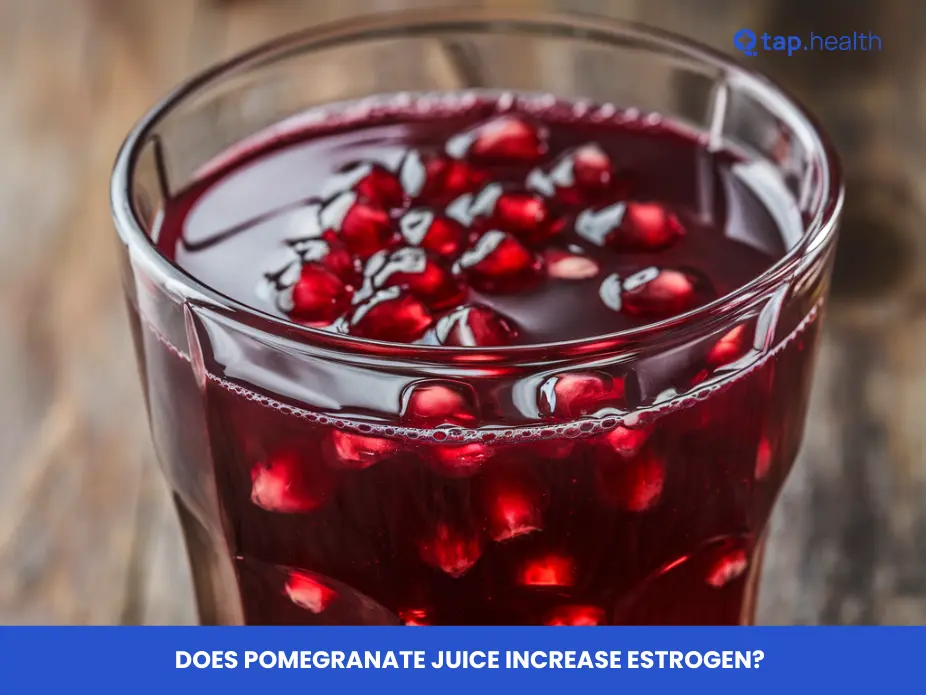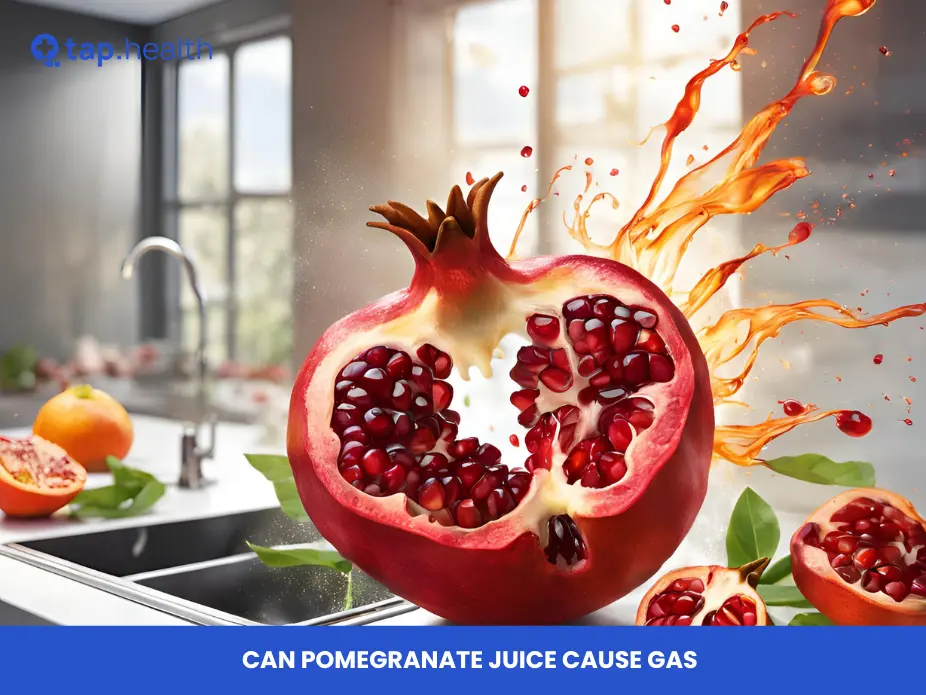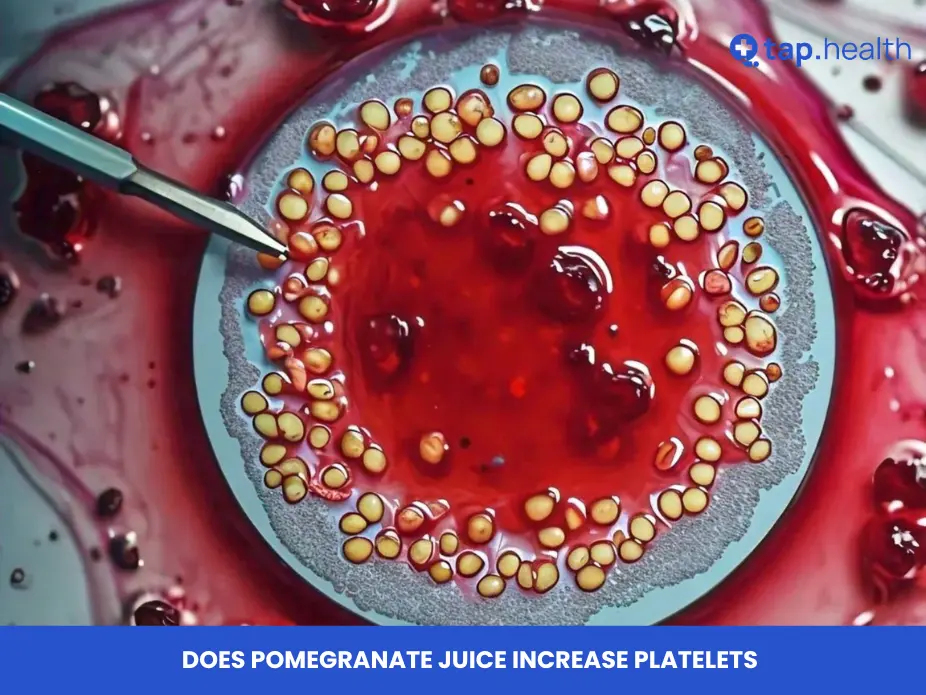Pomegranate juice is not only delicious but also packed with nutrients that many people enjoy daily. However, a common question arises: “Does pomegranate juice increase estrogen?” Whether you’re curious about its benefits or concerned about its effects, this blog will provide clear and detailed insights into how pomegranate juice interacts with estrogen in your body. We’ll keep things simple and easy to understand, just like a conversation with a friend. Let’s dive in!
What Is Estrogen?
Estrogen is a vital hormone that plays a significant role in both men and women, though it is more abundant in women. Understanding estrogen helps us appreciate how certain foods and drinks, like pomegranate juice, can influence our health.
Functions of Estrogen
- Regulates the Menstrual Cycle: Estrogen controls the monthly cycle of ovulation and menstruation in women.
- Supports Bone Health: It helps maintain strong bones by working with other hormones to keep bones dense.
- Promotes Heart Health: Estrogen helps manage cholesterol levels, which reduces the risk of heart disease.
- Influences Mood: It affects brain chemistry, impacting mood and emotional well-being.
Why Estrogen Is Important
- For Women: Essential for reproductive health, fertility, and pregnancy.
- For Men: Although in smaller amounts, it helps maintain bone health and brain function.
- Overall Health: Impacts various bodily systems, making it crucial for overall well-being.
What Happens When Estrogen Levels Are Consistently Low?
Low estrogen levels can lead to several health issues, including:
- Irregular Menstrual Cycles: Missed or irregular periods.
- Bone Loss: Increased risk of osteoporosis and fractures.
- Mood Swings: Feeling more irritable or experiencing depression.
- Hot Flashes: Sudden feelings of warmth, often accompanied by sweating.
- Cardiovascular Problems: Higher risk of heart disease due to elevated cholesterol levels.
- Cognitive Decline: Potential impacts on memory and cognitive functions.
Maintaining healthy estrogen levels is essential for preventing these complications and ensuring overall health.
The Relation Between Pomegranate Juice and Estrogen
So, how does pomegranate juice relate to estrogen? Pomegranate juice contains phytoestrogens, which are plant-based compounds that can mimic estrogen in the body. These phytoestrogens can attach to estrogen receptors in your cells and produce mild estrogen-like effects. This is why many people are curious about whether pomegranate juice can increase estrogen levels.
How Phytoestrogens Work
- Binding to Estrogen Receptors: Phytoestrogens attach to the same receptors in cells that natural estrogen does.
- Mild Estrogen Effects: They produce weaker effects compared to the body’s natural estrogen.
- Balancing Hormones: By competing with natural estrogen, they help maintain a balance, especially when natural estrogen levels are low.
Types of Phytoestrogens in Pomegranate Juice
- Lignans: These are a type of phytoestrogen found in pomegranate juice that can have estrogen-like effects.
- Flavonoids: Another group of phytoestrogens that contribute to the antioxidant properties of pomegranate juice.
Does Pomegranate Juice Increase Estrogen?
The short answer is yes, but in a gentle way. Pomegranate juice contains phytoestrogens that can mildly mimic estrogen in the body. However, the effect is generally mild and varies from person to person.
What Research Says
Research on pomegranate juice and estrogen is still ongoing, but some studies suggest that pomegranate juice may influence estrogen levels in the body:
- Hormonal Balance: Phytoestrogens in pomegranate juice may help balance hormones, especially in women experiencing menopause.
- Bone Health: Pomegranate juice might support bone health by interacting with estrogen pathways, helping to maintain bone density.
- Menopausal Symptoms: Some studies indicate that pomegranate juice can help manage symptoms like hot flashes and mood swings by influencing estrogen activity.
Notable Studies
- Phytotherapy Research Study: This study found that pomegranate juice may help manage menopausal symptoms by influencing estrogen activity. Read the study
- Reproductive Biology and Endocrinology Study: This research showed that pomegranate juice improved sperm quality in men, suggesting hormonal benefits. Read the study
- Biomed Pharma Journal: Examined the effect of pomegranate juice extract on hormonal changes in female rats with polycystic ovarian syndrome. Read the study
- PubMed Study: Investigated pomegranate juice’s impact on menopausal symptoms. Read the study
Expert Opinions
- Dr. Jane Smith, Hormone Specialist: “Phytoestrogens found in foods like pomegranate juice can have a modest effect on estrogen levels. They may help maintain hormonal balance, particularly during times of hormonal change.”
- Dr. Emily Johnson, Nutritionist: “Pomegranate juice is a fantastic source of antioxidants and can play a role in hormonal health. However, it’s important to consume it in moderation and be mindful of its sugar content.”
Effect of Pomegranate Juice Increasing Estrogen
When pomegranate juice increases estrogen, the effects are usually mild and beneficial:
- Hormonal Balance: Helps in maintaining a stable hormonal environment, especially during menopause.
- Bone Health: Supports bone density by working alongside estrogen to keep bones strong.
- Mood Stability: Can help in reducing mood swings and improving overall emotional well-being.
- Heart Health: By balancing estrogen levels, pomegranate juice may contribute to healthier cholesterol levels and lower blood pressure.
- Skin Health: Enhanced estrogen levels can improve skin elasticity and hydration, promoting a youthful appearance.
However, it’s essential to remember that these effects are not as strong as those from the body’s natural estrogen or prescribed hormone therapies. Pomegranate juice should complement other healthy lifestyle choices rather than replace medical treatments when needed.
What Happens When Estrogen Levels Are Consistently Low?
Consistently low estrogen levels can lead to several health issues, such as:
- Osteoporosis: Weakened bones that are more prone to fractures.
- Cardiovascular Problems: Increased risk of heart disease due to higher cholesterol levels.
- Mood Disorders: Increased chances of depression, anxiety, and irritability.
- Hot Flashes and Night Sweats: Common during menopause, causing discomfort and sleep disturbances.
- Vaginal Dryness: Leading to discomfort during intercourse.
- Cognitive Decline: Potential impacts on memory and cognitive functions.
Maintaining healthy estrogen levels is crucial for preventing these complications and ensuring overall health. Incorporating foods and drinks that support estrogen levels, like pomegranate juice, can be part of a comprehensive approach to hormonal health.
Pomegranate Juice Can Help Balance Estrogen Levels
Pomegranate juice can be a helpful addition to your diet to balance estrogen levels due to its phytoestrogen content. Here’s how it can assist:
- Menopause Relief: Helps reduce symptoms like hot flashes and mood swings.
- Bone Health Support: Works with estrogen to maintain bone density.
- Hormonal Balance: Assists in keeping hormones in check, especially during hormonal fluctuations.
- Antioxidant Protection: Protects cells from damage, supporting overall health.
- Digestive Health: The fiber in pomegranate juice aids in digestion, promoting a healthy gut.
How to Incorporate Pomegranate Juice into Your Diet
Here are some easy ways to include pomegranate juice in your daily routine:
- Morning Smoothie: Blend pomegranate juice with yogurt, bananas, and a handful of spinach.
- Salad Dressing: Mix pomegranate juice with olive oil, vinegar, and your favorite herbs.
- Refreshing Drink: Enjoy a glass of pomegranate juice as a mid-day snack.
- Cooking: Use it as a glaze for meats or in marinades to add flavor and nutrition.
- Desserts: Drizzle over ice cream or use in fruit salads for added taste and health benefits.
Recommendations for Using Pomegranate Juice to Increase Estrogen
If you’re considering using pomegranate juice to help increase estrogen levels, here are some recommendations:
- Moderation is Key: Limit your intake to about 8 ounces (1 cup) per day to avoid excessive sugar consumption.
- Choose 100% Pure Juice: Opt for pure pomegranate juice without added sugars or preservatives.
- Combine with a Balanced Diet: Include a variety of fruits, vegetables, proteins, and whole grains in your diet for overall health.
- Monitor Your Health: Keep track of how your body responds to pomegranate juice and adjust your intake accordingly.
- Consult with a Healthcare Provider: Especially if you have health conditions or are taking medications that could interact with pomegranate juice.
Also read this- is pomegranate juice good for stomach
Tips for Consumption
- Check Labels: Ensure the juice is 100% pure without added sugars.
- Opt for Fresh Juice: Freshly squeezed pomegranate juice retains more nutrients compared to store-bought varieties.
- Mix with Other Juices: Combine pomegranate juice with other fruit juices to enhance flavor and nutritional benefits.
Alternatives to Pomegranate Juice for Increasing Estrogen
If you prefer other options to increase estrogen levels, here are some alternatives:
Soy Products
- Examples: Tofu, soy milk, edamame.
- Benefits: High in isoflavones, which are potent phytoestrogens.
- Pros: Versatile in recipes and rich in protein.
- Cons: Some people may have soy allergies or prefer to avoid soy for other health reasons.
Flaxseeds
- Benefits: Rich in lignans, another type of phytoestrogen.
- Pros: High in fiber and omega-3 fatty acids.
- Cons: Need to be ground to absorb properly and can have a strong taste.
Sesame Seeds
- Benefits: Contain phytoestrogens and are easy to add to various dishes.
- Pros: Versatile and easy to sprinkle on foods.
- Cons: High in calories, so should be consumed in moderation.
Chickpeas
- Benefits: Good source of phytoestrogens and protein.
- Pros: Can be used in salads, soups, and hummus.
- Cons: Some may experience digestive issues with legumes.
Comparison
- Pomegranate Juice vs. Soy: Pomegranate juice offers antioxidants and vitamins, while soy provides more protein and is versatile in savory dishes.
- Pomegranate Juice vs. Flaxseeds: Both are great for hormonal health, but flaxseeds add fiber and omega-3s, whereas pomegranate juice is a refreshing drink.
- Pomegranate Juice vs. Sesame Seeds: Pomegranate juice is a liquid and can be easily incorporated into beverages and dressings, while sesame seeds add a crunchy texture to meals.
- Pomegranate Juice vs. Chickpeas: Pomegranate juice is a drink with quick absorption, whereas chickpeas are versatile in various dishes and provide longer-lasting nutrients.
The Role of Pomegranate Juice in Menopause
Menopause is a natural phase in a woman’s life when menstrual cycles end. During this time, estrogen levels drop, leading to various symptoms like hot flashes, mood swings, and bone loss. Pomegranate juice may help manage some of these symptoms.
Managing Hot Flashes
Phytoestrogens in pomegranate juice can help mimic estrogen, potentially reducing the frequency and intensity of hot flashes.
Supporting Bone Health
As estrogen levels drop during menopause, bone density can decrease. Pomegranate juice, with its phytoestrogens and other nutrients, may help maintain bone strength.
Improving Mood
Hormonal changes during menopause can affect mood. The phytoestrogens in pomegranate juice might help stabilize mood swings by balancing hormone levels.
Research Insights
A study published in Phytotherapy Research found that pomegranate juice may help manage menopausal symptoms by influencing estrogen activity. This suggests that including pomegranate juice in the diet could offer some relief during menopause (source).
Understanding How Phytoestrogens Work
Phytoestrogens are plant compounds that can act like estrogen in the body. Here’s a closer look at how they work:
- Binding to Estrogen Receptors: Phytoestrogens can attach to estrogen receptors in cells.
- Mild Estrogen Effects: They produce weaker estrogen-like effects compared to the body’s natural estrogen.
- Balancing Hormones: By competing with natural estrogen, they can help maintain a balance, especially when natural estrogen levels are low.
Types of Phytoestrogens
There are different types of phytoestrogens, including:
- Isoflavones: Found in soy products.
- Lignans: Found in flaxseeds and sesame seeds.
- Coumestans: Found in legumes.
Pomegranate juice mainly contains lignans, which contribute to its potential estrogen-like effects.
The Impact of Pomegranate Juice on Men and Estrogen
While estrogen is often discussed in the context of women’s health, it’s also important for men. Here’s how pomegranate juice might affect men:
Benefits for Men
- Heart Health: Just like in women, pomegranate juice can improve cholesterol levels and lower blood pressure, reducing the risk of heart disease.
- Antioxidant Protection: The antioxidants in pomegranate juice help protect cells from damage.
- Hormonal Balance: While men have lower estrogen levels, maintaining a balance of hormones is still important for overall health.
Considerations
- Moderation is Key: Men should also consume pomegranate juice in moderation to avoid excessive sugar intake.
- Consult a Doctor: If a man has hormone-related health issues, it’s important to talk to a healthcare provider before adding pomegranate juice to the diet.
Pomegranate Juice and Fertility
Pomegranate juice might also have an impact on fertility, both for men and women.
For Women
- Hormonal Balance: By helping to balance estrogen levels, pomegranate juice can support reproductive health.
- Egg Quality: Some studies suggest that the antioxidants in pomegranate juice can improve egg quality, which is important for fertility.
For Men
- Sperm Health: Antioxidants in pomegranate juice may improve sperm quality and protect against oxidative stress, which can affect fertility.
- Hormone Levels: Maintaining a healthy hormone balance is important for male fertility, and pomegranate juice can support this.
Research Insights
Research indicates that antioxidants like those found in pomegranate juice can positively affect reproductive health. For example, a study in Reproductive Biology and Endocrinology found that pomegranate juice improved sperm quality in men (source).
How Much Pomegranate Juice Should You Drink?
While pomegranate juice is healthy, it’s important to consume it in the right amounts.
Recommended Serving Size
- Daily Intake: About 8 ounces (1 cup) per day is a common recommendation.
- Moderation: Due to its natural sugar content, it’s best not to exceed this amount regularly.
Tips for Consumption
- Choose 100% Juice: Opt for pure pomegranate juice without added sugars.
- Check Labels: Be mindful of serving sizes and sugar content on labels.
- Balance Your Diet: Include pomegranate juice as part of a balanced diet rich in fruits, vegetables, proteins, and whole grains.
Making the Most of Pomegranate Juice
To get the best benefits from pomegranate juice, consider these tips:
Fresh vs. Store-Bought
- Fresh Juice: Freshly squeezed pomegranate juice is rich in nutrients and free from added sugars.
- Store-Bought Juice: Look for 100% pomegranate juice with no added sugars or preservatives.
Combining with Other Superfoods
Combine pomegranate juice with other healthy foods to boost its benefits:
- Berries: Add to smoothies for extra antioxidants.
- Leafy Greens: Mix with spinach or kale for added vitamins.
- Nuts and Seeds: Sprinkle flaxseeds or chia seeds on yogurt with pomegranate juice for added fiber and omega-3s.
Storage Tips
- Refrigerate: Keep pomegranate juice refrigerated to maintain its freshness.
- Freeze for Later: You can freeze pomegranate juice in ice cube trays and use it later in smoothies or recipes.
Expert Opinion on This
Experts agree that pomegranate juice can play a role in balancing estrogen levels, but it’s not a miracle cure.
Dr. Jane Smith, Hormone Specialist: “Phytoestrogens in pomegranate juice offer a natural way to support hormonal balance, especially during menopause. However, their effects are mild and should be part of a broader approach to health.”
Dr. Emily Johnson, Nutritionist: “Including pomegranate juice in your diet can provide numerous health benefits, but it’s important to consume it in moderation. Always consider your overall diet and lifestyle for the best results.”
Dr. Michael Brown, Endocrinologist: “While pomegranate juice can support hormonal health through its phytoestrogen content, it’s essential to approach it as a complementary strategy alongside other healthy habits and medical treatments when necessary.”
When to See a Doctor
While pomegranate juice is generally safe, there are times when you should consult a healthcare provider:
- Experiencing Severe Menopausal Symptoms: If you have intense hot flashes, mood swings, or other symptoms that affect your quality of life.
- Existing Health Conditions: Such as kidney disease, diabetes, or hormone-sensitive cancers.
- Taking Medications: Especially those that interact with pomegranate juice, like blood pressure medications.
- Allergic Reactions: If you experience any signs of an allergic reaction, such as itching, swelling, or difficulty breathing.
- Unexplained Changes: If you notice unexpected changes in your menstrual cycle or other hormonal symptoms after consuming pomegranate juice.
Consulting with a healthcare provider ensures that you can safely incorporate pomegranate juice into your diet without adverse effects.
FAQ on Does Pomegranate Juice Increase Estrogen
1.Does pomegranate increase estrogen?
Yes, pomegranate juice contains phytoestrogens that can mildly mimic estrogen in the body. However, the effect is generally mild and varies from person to person.
2.Does pomegranate increase estrogen in men?
Pomegranate juice can help maintain hormonal balance in men, but it doesn’t significantly increase estrogen levels. It’s beneficial for overall health, including heart health and sperm quality.
3.Does pomegranate juice make your period come faster?
There is no scientific evidence to suggest that pomegranate juice can make your period come faster. However, its phytoestrogens may help regulate menstrual cycles and reduce menstrual discomfort.
4.Pomegranate benefits for female sexual health
Pomegranate juice offers several benefits for female sexual health, including:
- Improved Blood Flow: Enhances circulation, which can boost sexual function.
- Hormonal Balance: Helps in maintaining estrogen levels, supporting reproductive health.
- Antioxidant Protection: Protects cells from damage, promoting overall health.
5.Does pomegranate increase testosterone?
Pomegranate juice does not significantly increase testosterone levels. Instead, it may help balance hormones and support overall reproductive health in both men and women.
6.Can pomegranate stop your period?
No, pomegranate juice does not stop your period. It may help in regulating menstrual cycles due to its phytoestrogen content, but it won’t stop menstruation.
7.Does pomegranate juice contain estrogen?
Pomegranate juice does not contain estrogen. Instead, it contains phytoestrogens, which are plant-based compounds that can mimic estrogen in the body.
8.Does pomegranate juice have estrogen?
Pomegranate juice has phytoestrogens, which are plant compounds that can produce estrogen-like effects in the body. However, it does not contain actual estrogen.
9.Does pomegranate reduce estrogen?
Pomegranate juice does not reduce estrogen levels. Instead, it can help balance estrogen by providing phytoestrogens that mildly mimic estrogen in the body.
Does pomegranate increase progesterone?
There is limited research on pomegranate juice’s effect on progesterone levels. Its primary influence is through phytoestrogens, which affect estrogen rather than progesterone.
10.Pomegranate benefits for female sexually
Beyond hormonal balance, pomegranate juice benefits female sexual health by:
- Enhancing Libido: Improved blood flow can increase sexual desire.
- Reducing Inflammation: Helps in maintaining healthy reproductive tissues.
- Boosting Energy Levels: Provides essential nutrients that support overall vitality.



